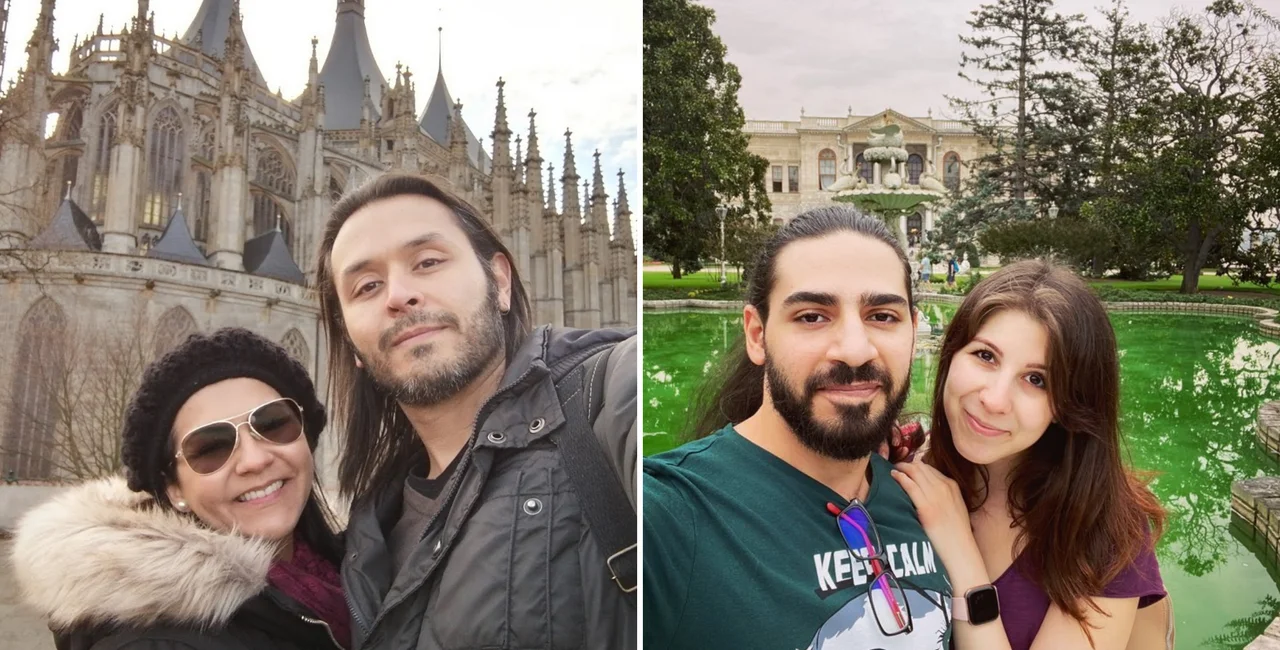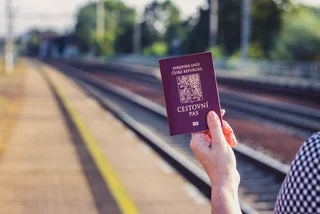The Czech Republic's so-called "sweetheart visa" has helped hundreds of long-distance couples separated by border restrictions to reunite in the country following the nationwide lockdown in the spring.
But many couples who don't fall into the narrow set of requirements laid out by the government feel left behind and forgotten, unable to reunite with their partners.
The Czech Republic is one of a handful countries in the European Union that now allows long-distance, unmarried couples to reunite with their Czech partner in the country.
The government has helped reunite 461 couples in the Czech Republic; most of those have been citizens from the United States (which comprised 203 requests) and the Ukraine (58 of those requests), according to the Ministry of Foreign Affairs.
The government said they rejected around 100 requests which they claim were "demonstrably not long-term relationships or tied to fake documents."
"Thanks to my colleagues at Ministerstvo zahraničních věcí České republiky for helping foreigners and Czechs who have a lasting relationship so that they can be together even in times of pandemic restrictions," Foreign Minister Tomáš Petříček wrote on Facebook. "We are working using the term Agenda of Love."
However, the contingencies for reunification have left many couples stranded by red tape: couples must fill out a solemn declaration of their relationship and provide supporting documents like a joint bank account, a joint lease, or a birth certificate for a child.
Expats.cz has reached out to the Ministry of Foreign Affairs and received the following statement:
"So-called sweetheart visa already helped more than 461 couples in the last three months. We rejected only about 100 requests, mostly due to forgery of documents," Zuzana Štíchová, Director of the Press Department, said. "Unfortunately, the valid regulations (set by the Czech Ministry of Health) do not currently allow arrival of a foreigner who needs a visa to travel to the Czech Republic."
Petříček's post this week comes as a slap in the face for many couples, both married and in committed long-distance relationships, who may not have a joint bank account, joint lease or birth certificate of a child to prove that they're in a long-distance relationship.
Daniel Castro, a Brazilian living in the Czech Republic as a resident, has been with his wife Carine for two years now. The pair applied for the family reunification visa almost a year ago and moved to Prague shortly after, thinking they would be approved in the meantime.
But Carine's visa expired and she left the country right before the borders closed, and she's been back in Brazil ever since, waiting to see her husband again.

"Remotely I keep in touch with my partner and the rest of my family in Brazil and it's hard to see how she is suffering from this though situation still waiting for visa approval 11 months after submitting the application," Daniel told Expats.cz. "In this meantime, I moved to another apartment, our dog had breast cancer surgery, I adopted another cat, and we feel like she is missing our family life."
In September, the couple learned they had been rejected for the family reunification visa; officials claimed they did not have enough evidence proving they were a couple, even after they submitted a Public Deed of Stable Union. They have since appealed and are awaiting the decision.
In the meantime, the couple isn't eligible to apply for the sweetheart visa, according to the Ministry of the Interior (MOI), because he isn't an EU citizen.
"Anyway, I'm a resident here, part of the society, I work and pay taxes, but I don't have the same rights to bring my partner to spend some time here with me as is allowed in other countries," Daniel explained to Expats.cz. "It doesn't make sense, is cruel and unfair."

The reunification process has been an issue for EU citizens living in the Czech Republic as well.
Prague resident Ioanna and her partner Karim, a Jordan native, spoke to Expats.cz about their struggle to reunite back in August. The couple had planned to move in together in April 2020, when Karim had a visa to enter the EU, but their plans were put on hold when the European Union closed its borders in March due to the coronavirus pandemic.

Ioanna and Karim can't reunite under the "sweetheart visa" because Karim would need a visa to enter the European Union. When she applied for the visa, a representative wrote back and said that there was "no need to send any documents as your partner is not a holder of a Schengen visa."
Seeing Petříček's post this week came as a "slap on the face," Ioanna told Expats over messenger, especially given all the couple has had to go through.
"His post is very hypocritical because the email he chose to showcase is an exceptional case and doesn’t represent 99 percent of the couples," she said. "Nobody in a long distance relationship can provide joint lease or joint bank accounts and bills."

The couple has since been able to meet in Turkey, where both of them could travel with fewer restrictions. But they don't know when they will be able to see each other again, especially with further measures in place across the Czech Republic.
Ioanna isn't the only EU resident struggling with the limiting circumstances of the reunification process. Pierre Donat-Bouillud, a French native living in the Czech Republic, has been trying to reunite with his long-distance girlfriend Nastya Moscovaya, a Russian native, for months now.
But because Nastya is a Russian citizen and would need a visa to enter the country, their claims have been denied.

"The thing is I would not call these regulations a 'Sweetheart visa' as they explicitly exclude people who need to apply for a visa," Pierre told Expats.cz in an interview. "I don't understand why they prevent residents from a third-party country and partners needing a visa to enter but there is a pattern, isn't there?"
The pair has known each other for two years and they have been dating for one year. Under ordinary circumstances, Pierre and Nastya wouldn't go a month without seeing each other.
Nowadays, the couple talks and video chats regularly to keep in touch -- and they have even been able to meet up in Turkey, which has fewer restrictions for travelers.
But the hardest part for the Nastya and Pierre is not knowing when they may see each other again, despite their ongoing fight to reunite.

"I think the most difficult is not to know when we will meet again," Pierre added. "It's difficult to have projects as a couple like that."
The European Union has said before that they want to allow unmarried couples where one person is an EU resident to be able to reunite.
Célia asked President @vonderleyen about the separation of unmarried couples due to the pandemic.
— European Commission 🇪🇺 (@EU_Commission) October 22, 2020
The President reaffirmed our commitment to continue pushing for people to be able to reunite with their loved ones. ↓#LoveIsNotTourism #AskThePresident pic.twitter.com/YHcjaDKQoE
"We have repeatedly asked European countries to allow unmarried couples to reunite," Ursula von der Leyen, president of the EU Commission, said on Twitter Thursday. Half of the EU member states have accepted the requested and allowed unmarried couples to reunite.
Von der Leyen vowed to continue to convince the other countries to allow couples to reunite.
In the meantime, couples continue to fight to reunite, sharing their stories online under the #LoveIsNotTourism hashtag.












 Reading time: 5 minutes
Reading time: 5 minutes 

































